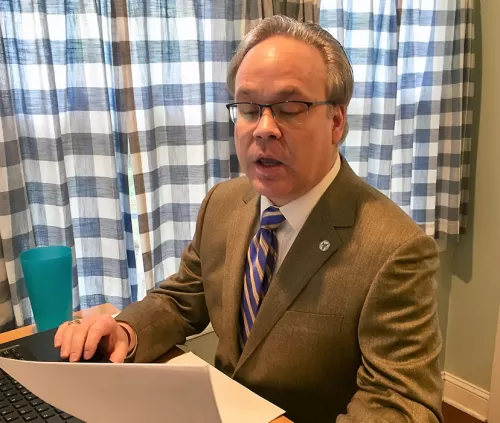NCUA Board Member Todd M. Harper delivers remarks remotely from his home during the May 2020 Board Meeting.
As Prepared for Delivery on May 21, 2020
Thank you for your presentations, Myra and Ian. While I appreciate the staff time spent on this matter, I have spoken with consumer advocates, and I cannot support this interim final rule on overdraft policy because the NCUA is missing a tremendous opportunity to provide credit union members with some substantive and real relief. Moreover, this rulemaking is being rolled out under a sketchy administrative process.
The coronavirus-induced economic slowdown is, without a doubt, disproportionately affecting lower-income households. According to a survey by the Board of Governors of the Federal Reserve System, the hardest hit households are the 40 percent of Americans earning less than $40,000 a year. Regrettably, that number of households will almost certainly grow in in the coming months.
The Federal Reserve survey also showed that one in five American workers lost their jobs in March. Let me repeat that: One in five Americans have lost their jobs because of COVID-19. And, as of today, a record number of 38.5 million workers had filed for unemployment benefits in just nine weeks.
The pain is real. And these statistics clearly show that we need to be doing more to protect households from the escalating economic fallout of the coronavirus by eliminating or capping fees or taking other consumer financial protection actions.
The NCUA has done much in the past three months to protect the safety and soundness of the credit unions, and credit unions are participating in numerous government programs to help them stay liquid and make loans. Credit union members also deserve to see some real relief from the NCUA. Counter to the text of the interim final rule, in actuality this rulemaking does almost nothing to “provide credit union members the flexibility needed to cope with the impacts of COVID-19.”
Instead, under this interim final rule, credit unions will be allowed to charge the overdraft after about 60 days, and the credit union will still have the right to offset. That means the credit union can garnish its members’ income, including economic stimulus relief funds, to pay off the overdraft debt. It’s like having your cake and eating it, too.
The agency had an opportunity to propose some substantive relief for credit union members in this interim final rule. Even temporary relief would have been helpful.
Instead, this accounting “policy” change is being rushed through as an interim final rule, without a proper notice-and-comment process under the Administrative Procedure Act. The kicker to all of this is that this rule does not sunset. It permanently changes the NCUA’s overdraft accounting policy.
Overdraft products can be one of the most abusive consumer financial products, and overdraft fees impose a great burden on struggling families who live paycheck to paycheck. Research has shown that consumers are charged billions upon billions of dollars in overdraft fees each year, and member-owned, not-for-profit credit unions are no exception to this practice.
The New York Times has reported about one credit union that makes 52 cents in fees for every dollar in interest income.1 This story highlighted the plight of a dishwasher who earned about $30,000 over a year, but spent approximately $2,000 on fees on his checking and savings accounts at the credit union.
As the Center for Responsible Lending has noted: “With abusive overdraft fees, financial institutions take advantage of customers fighting desperately to stay afloat. Ultimately, these fees drive many from the banking system altogether and make reentry very difficult.”
Millions upon millions of households are suffering in this economic crisis. The NCUA Board should have used this situation to take bold action to help those credit union members in need and not undermine the system’s resiliency.
My hope is that going forward the Board will step up and work to help credit union members in harm’s way — not just the credit unions. It is unacceptable to use this crisis as an excuse for financial deregulation.
For all of the policy, process, and procedural reasons that I have laid out, I will oppose this interim final rule. Thank you, Mr. Chairman. I have no further comments.



